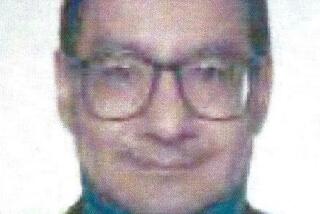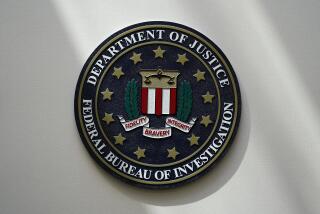Chilean Surrenders in 1976 Killing
- Share via
WASHINGTON — In a move that may further strain U.S.-Chilean relations, a former Chilean secret police captain has turned himself over to U.S. authorities and agreed to cooperate in the investigation of the 1976 Embassy Row murder of exiled Chilean diplomat Orlando Letelier, The Times learned Tuesday.
Capt. Armando Fernandez, one of three intelligence officials who was indicted in the slaying, and whom Chile refused to extradite, will plead guilty in federal court here today to a lesser charge of accessory to murder in exchange for a short prison term and federal protection, sources close to the case said.
May Reopen Case
The surprise development follows extensive discussions between Fernandez and the office of U.S. Atty. Joseph E. diGenova, conducted in a South American country. Sources said it will reopen the celebrated case, which involved one of the boldest acts of political terrorism committed in the nation’s capital by foreign operatives.
Letelier was Chile’s ambassador to the United States from 1971 to 1973 during the regime of President Salvador Allende. On Sept. 21, 1976, three years after Allende died in a coup that installed Augusto Pinochet as the Chilean leader, Letelier and an American colleague, Ronni Moffitt, were killed by a bomb planted in Letelier’s car.
In 1978, an American who worked for the Chilean secret police, Michael V. Townley, admitted planting the bomb and implicated Fernandez and other Chilean intelligence officials in the planning of the assassination.
Chileans Indicted
Townley pleaded guilty under a plea agreement and was released after serving three years and four months in prison, and Fernandez, Gen. Manuel Contreras, former head of Chile’s secret police, and Col. Pedro Espinoza, Fernandez’s superior, were indicted on murder charges.
In an action that bruised U.S.-Chilean relations, Chile in 1979 refused to extradite the officials or put them on trial, contending that the evidence against them was insufficient.
Fernandez, sources close to the investigation said, regards himself as “a marked man,” vulnerable to attacks from extremists of the right and left. Under pressure from family members, he is said to have decided that his best prospects for safety were to surrender to U.S. authorities, plead guilty to a lesser charge and to assume a new identity under the witness protection program.
Case May Be Strengthened
With Fernandez’s cooperation, officials said, they believe they will be able to build a stronger case against the Chileans previously implicated as well as a third individual not previously linked with the case. They would not say whether this would lead the Administration to renew efforts to extradite the suspects.
According to Townley’s testimony, Fernandez conducted surveillance of Letelier in Washington in August, 1976. The bomb was triggered as Letelier’s car drove through Sheridan Circle, near the heart of the district where many foreign embassies are situated.
In addition to Townley, two leaders of a Cuban exile group, Guillermo Novo and Alvin Ross, and Novo’s brother, Ignacio, were prosecuted in connection with the slaying but were acquitted after a retrial ordered by the U.S. Circuit Court of Appeals.
Suspects Are Fugitives
Two other members of the exile group, the Cuban Nationalist Movement, Jose Dionisio and Virgilio Paz, are fugitives in the case.
Several violent incidents have added to the distance between the U.S. and Chilean governments. In one, Chilean soldiers last summer allegedly set on fire a 19-year-old Washington resident, Rodrigo Rojas, who had returned for a visit to Chile.
Last November, the United States abstained on a World Bank vote granting Chile a $250-million loan, signaling Washington’s objections to the human rights abuses of the Chilean regime.
More to Read
Sign up for Essential California
The most important California stories and recommendations in your inbox every morning.
You may occasionally receive promotional content from the Los Angeles Times.










